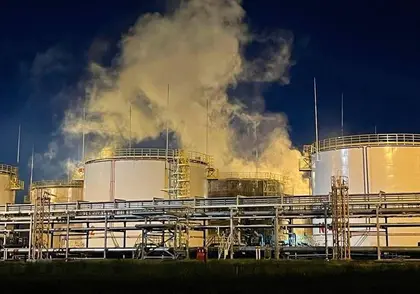Drone strikes on refineries, train sabotage: attacks on Russian infrastructure have multiplied in recent weeks, which experts suggest are part of Ukraine's preparations for an expected spring offensive.
While Kyiv has not claimed any of the acts denounced by Moscow as Ukrainian "sabotage" of "unprecedented momentum", the majority appear to target Russian army supply chains in border regions and in annexed Crimea, a base for Russian troops.
JOIN US ON TELEGRAM
Follow our coverage of the war on the @Kyivpost_official.
"All of this was done to prepare for an offensive," said Mykhailo Samus, deputy director of the Center for Army, Conversion and Disarmament Studies in Kyiv.
"I am sure that the intensity (of the attacks) will increase," he added.
A senior Ukrainian official told AFP that "these are standard measures for limiting the capabilities of the Russian armed forces."
"Ukraine does not violate humanitarian law" through the acts, he added on condition of anonymity.
Oil facilities -- essential for supplying the troops -- appear to be the priority targets of the attacks, which have been generally carried out with drones.
Unlike combat inside the country -- where Western arms play a crucial role -- "Ukrainian-made weapons are being used primarily to strike Russia," Samus said.
"There is a certain consensus on not using German, French or American arms to hit Russian territory," he added.
- 'Not enough' -
The list of incidents has expanded on a near daily basis.

Putin Vows ‘Destruction’ on Ukraine After Kazan Drone Attack
On Thursday, a drone was shot down near an airbase in Sevastopol in the Crimea peninsula annexed by Russia in 2014.
That same day, Russia's southern Krasnodar and Rostov regions, both near Ukraine, reported drone strikes that caused fires. On Friday, another fire broke out at the same oil refinery in Krasnodar.
Over the past week, two fuel depots also caught fire, in and around Crimea, while last weekend an overnight Ukrainian strike on the Russian border village of Suzemka left four dead.
Also in Russia's Bryansk region bordering Ukraine, two freight trains derailed earlier this week after explosive devices went off on the tracks.
The British defense ministry on Friday said the "recent uptick in Russian rail accidents... has almost certainly caused short-term localized disruption to Russian military rail movements."
Samus for his part said "the Ukrainian army's sphere of activity is expanding. It's preparation for the liberation of Crimea" and the partially occupied southern regions of Zaporizhzhia and Kherson.
He said that because of the hits on Russia's Rostov region, Russia will have to move its military depots elsewhere, which will extend the routes its troops will be forced to travel.
Another Ukrainian military expert said these attacks of limited impact are an attempt to "compensate" for a lack of long-range weapons capable of striking deep inside Russia, which the West refuses to deliver to Kyiv.
"We manage as well as we can" but "it is not enough", said the analyst who wished to remain anonymous because of the sensitivity of the issue.
- 'Strange' attack on the Kremlin -
He added with regret that "many drones are shot down by the Russians".
The most spectacular of the incidents, this week's alleged drone attack on the Kremlin, appears to stand out from the rest.
Russia alleges that the United States masterminded the attack and Ukraine carried it out overnight Tuesday into Wednesday with two drones, aiming to kill President Vladimir Putin.
Experts from Ukraine and the West have expressed doubts about the theory, saying that whatever its symbolic value, the incident has no military significance for Ukraine.
"These drones do not fit in with the preparations for the offensive," said Samus.
The US-based Institute for the Study of War said that "several indicators suggest that the strike was internally conducted and purposefully staged," probably in order to mobilize Russian society.
Kyiv and Washington have both strongly denied involvement in the incident. Paris called the alleged attack "strange" while the European Union warned Moscow to not use it to escalate its war in Ukraine.
"We've been clear with" the Ukrainians "that we do not encourage, nor do we enable them to strike outside Ukraine," John Kirby, spokesperson for the White House National Security Council, said on Thursday.
The Washington Post reported last month that Ukraine had been planning strikes on Moscow for the first anniversary of the invasion in February but abandoned the idea at Washington's request.
You can also highlight the text and press Ctrl + Enter






